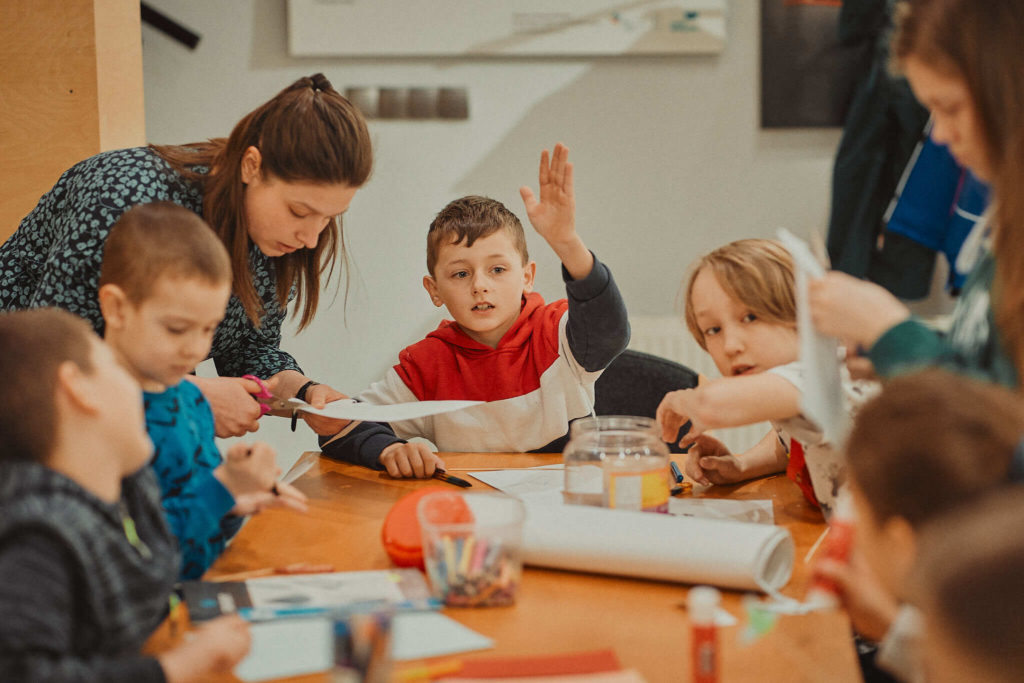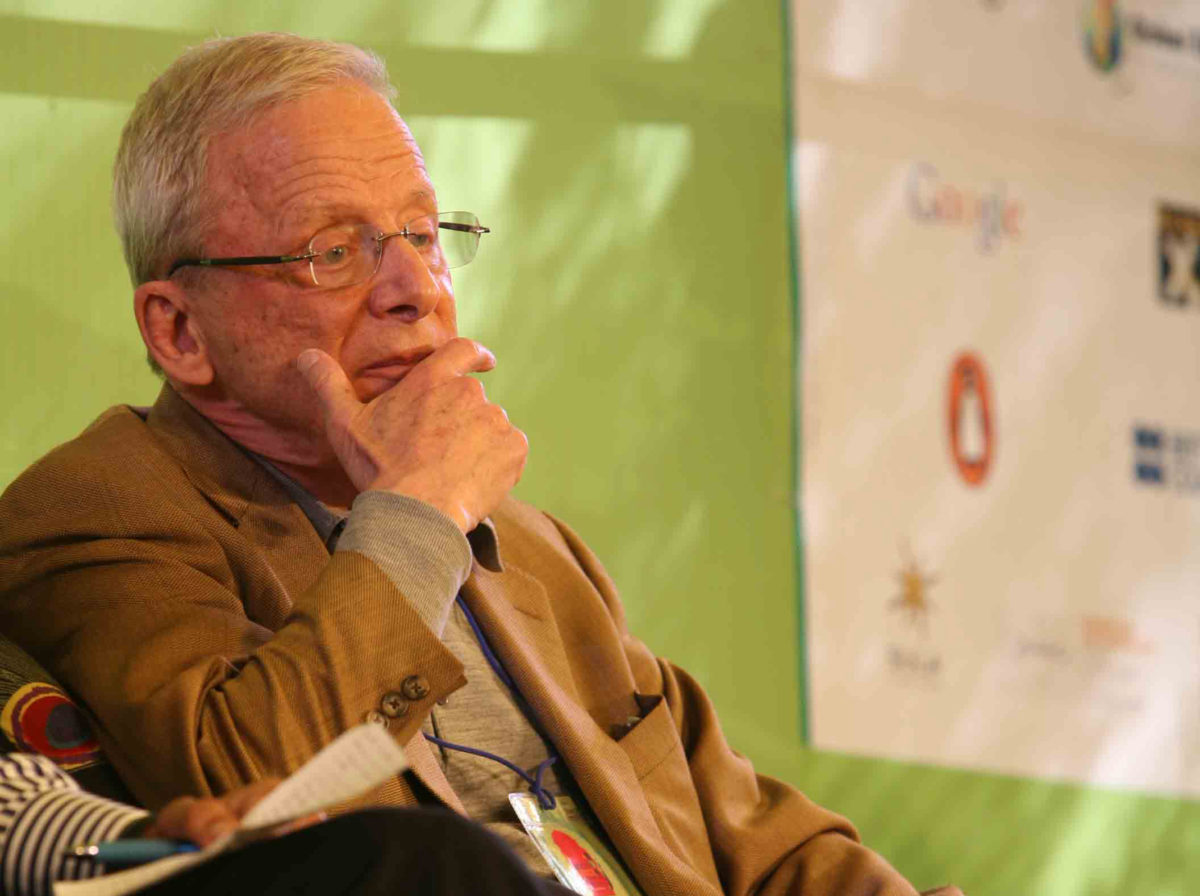Your Daily Phil: Birthright’s new coding boot camp + A Conservative response on intermarriage
Good Tuesday Morning,
When it launched in 1999, Birthright Israel’s pitch was focused on a free 10-day trip to Israel that aimed to introduce young adults to the country and strengthen their Jewish identities when they returned to campus or post-college life in the Diaspora.
In the decades since, that mission has expanded a bit: For a few years, the trips were open to Jews as old as 32. And this year, after passing the milestone of 750,000 total participants, Birthright merged with Onward Israel, which places young Jews with six- to 10-week programs (such as internships or academic study) in the Jewish state.
Now, Birthright’s latest program proposes to bring young Jews to Israel not for a matter of days or weeks — but for two years. And in addition to benefiting Diaspora Jews, it hopes to fill one of Israel’s needs — growing demand for web developers in its sprawling tech industry.
The just-launched Brightcode is a coding boot camp for Diaspora Jews ages 18 to 32 that, the organization promises, will lead to a guaranteed job at an Israeli tech company for two years, with a competitive salary. The program’s pilot stage will launch in June with a cohort of 20 to 25 students, who will spend five months virtually, and one month in-person in Tel Aviv, learning to be Full Stack developers — in other words, coders who can work on all aspects of web development. They will then be placed in their two-year jobs with the help of a tech solutions company.
“Brightcode does not represent a change in Birthright’s mission,” Noa Bauer, Birthright’s vice president of marketing, told eJewishPhilanthropy. “We’re willing to offer a lot of things that are needed in the Jewish world…. If more such possibilities arise, we’re open to offering more opportunities through the high-tech industry in Israel.”
Observers of Israel’s tech scene have been warningfor years that a lack of developers could spell trouble for its startup ecosystem. Birthright says it can help address that gap by tapping into its expansive Rolodex of alumni, some of whom may be eager to learn a new skill set in an increasingly digital economy. Birthright is partnering on the project with the Israel Innovation Authority, a government-funded agency that also recruits underrepresented populations — like women, Israeli Arabs and Haredi Jews — to work in tech.
Demand for Birthright’s program is high: Some 700 people applied for roughly two dozen spots. Birthright said it “does not encourage or discourage people” from immigrating to Israel permanently, but that it would support those who do make that choice.
“We’re always happy for people to have a longer immersive experience in Israel,” Bauer told eJP. “And we think that within the two years, if the Brightcode participants decide to either stay or go back to their Jewish communities, both are great choices from our standpoint.”
Working the Land
A Jewish farm in SoCal offers salts, honey — and a space for adults with disabilities


Ben Novak, 23, a metal sculpture artist, works at Shemesh Farms twice a week.
On workdays, the Farm Fellows at Shemesh Farms in Southern California check in with their supervisor to talk about their roles and goals for the day: which plants they’ll be working with and what jobs need to be done — from harvesting and drying herbs to mixing, jarring and packaging the artisanal salt blends they sell on their website, in local specialty stores and at farmers’ markets. The Farm Fellows program, which engages young adults with what Shemesh Farms describes as a range of “special needs and diverse abilities,” is “human-centered and takes the varying needs of the fellows into account,” said Michelle Cait, the farm’s outgoing director. This means, she added, encouraging their talents and challenging them to grow, to “explore various work modalities in order to find what is meaningful,” she told eJewishPhilanthropy’s Esther D. Kustanowitz.
A temporary home: Shemesh Farms is part of the Shalom Institute, an experiential Jewish educational organization that also runs Camp JCA Shalom in Malibu, a residential summer camp for kids that used to house the farm. The Shalom Institute also runs the nearby Camp Gesher, an overnight camp on the West Coast for campers from Russian-speaking Jewish families. After the November 2018 Woolsey Fire incinerated nearly 100,000 acres in Los Angeles and Ventura counties — including the campuses of JCA Shalom and two other Jewish camps — Shemesh Farms moved to its current temporary home at the Malibu Jewish Center, off of California’s Pacific Coast Highway, which — on the day of eJP’s visit — provided a subtle, constant hum of background audio for the small farm’s agricultural work.
‘Truly made for him’: Parents of the fellows say the farm provides a rare comfortable space for their children to learn and grow. Jennifer Novak’s 23-year-old son Ben is a neurodiverse artist who works in metal sculpture and has been working at Shemesh Farms intermittently since it started in 2014. Since the end of May 2021, Ben has been going twice a week. “Shemesh Farms is the high point of his week…Shemesh is the one place in Los Angeles that was truly made for him and his peers,” Novak said.
A focus on sustainability: The Shalom Institute’s executive director, Bill Kaplan, said that sustainably rebuilding the institute and a continued focus on disability inclusion are priorities moving forward. “It’s unbelievable that [sustainability is] still not on the up there on the agenda for many institutions,” he said. “When it comes to sustainability and inclusion,” he added, Shemesh Farms is “actually the integration of the two. It’s super important, and it’s a natural fit.”
In Response
As rabbis, we believe a new intermarriage narrative can strengthen Conservative Judaism


“For decades, the Conservative movement has shamed Jews who dated or married those of other faith or cultural backgrounds and created a stigma for the Jewish partners and their families. It has not worked. It is time for a different approach,” write Rabbi Charles Arian, Rabbi Chaya Bender, Rabbi Steven Henkin and Rabbi Ben Herman in an opinion piece for eJewishPhilanthropy, which is also endorsed by a number of other Conservative rabbis.
Eschewing binary thinking: “Either/or thinking has often been at the core of the discussion about interfaith marriage. Either we accept or we do not, either we officiate or do not, either the Jewish-adjacent partner converts or does not, either we consider the children Jewish or do not, either we are welcoming or are not. The ones who are hurt by this approach are not just the families themselves, but also the movement that takes these hardline positions. Such binary thinking ignores the personal narratives of the families. Many Jewish-adjacent partners lead the charge in raising Jewish children by taking them to religious school, day school, and/or Jewish summer camp (and paying the associated tuitions); learning how to maintain a kosher kitchen, bake challah and fry latkes; learning Jewish history and practices to help their children with religious school homework. It ignores the consequences of decades of guilt and ‘bad Jew syndrome’ we have instilled in those who marry out of the faith. Either/or thinking ignores the complexity of the issue and turns away from the humanity of it.”
Inclusive innovation helps everyone: “When we seek to make Judaism more inclusive, it helps every Jew along the way. When we teach and explain our tradition, it helps educate Jews who may not have learned those pieces of the tradition. When we transliterate Hebrew in our communities, it helps those Jews who never learned Hebrew. Every innovation and change to make tradition more accessible helps both Jews and those who are Jewish-adjacent.”
Mental Health
The kids are not all right


“Ask any therapist treating young adults, and they will tell you the same thing: Their phones are ringing nonstop, waiting lists are building, parents are worrying and our youth are suffering. The statistics are well-documented (see the American Psychological Association, CDC and National Institute of Mental Health, to name a few) and reflect what we all see to be true: rates of mental illness, anxiety and depression in particular, are on the rise among teens and young adults,” Dr. Debra Alper, a licensed clinical psychologist on staff at the Yeshiva University counseling center and the founder of Kadima Psychotherapy, writes in an opinion piece for eJewishPhilanthropy.
How can they keep up?: “We are asking more of our young people than ever before. We demand academic rigor and social perfection. Students today balance ever more challenging course work with the pressure of one day stepping up into their parents’ financial shoes to support families of their own. Our students see futures of houses and babies and yeshiva tuition and Pesach programs, and how can they not wonder how they will ever keep up?”
Modeling imperfection: “This cannot be the community we intended to create. The barriers to entry are too high and the price of inclusion is too steep. Human weakness must be OK. We must be allowed to be imperfect, and we must model to our children that we accept differences. Struggles are a part of life, and to deny that is to lie about the most basic truth of our humanity.”
Lessen the pressure: “And so, what I am suggesting is less. Less pressure, fewer demands, less judgment and less comparison. Let’s find ways to opt out, instead of creating more and more to which we must opt in. Let’s lessen the pressure to check every box, and do so on a timetable that can’t possibly work for everyone. Let’s erase the need to maintain the illusion of perfection.”
Worthy Reads
Effective Altruism: Thirty-year-old crypto billionaire Sam Bankman-Fried gave away $50 million last year and is part of the “effective altruism” movement, writes Zeke Faux in Bloomberg: “Young tech entrepreneurs like Bankman-Fried have turned the effective-altruism movement into a force in philanthropy. More than 7,000 people have pledged at least 10% of their career earnings through a group run by the Centre for Effective Altruism. Dustin Moskovitz, a Facebook founder, donates hundreds of millions of dollars a year to charities the movement has identified as effective. Tesla Inc.’s Elon Musk enlisted a pro-poker-player-turned-effective-altruist to advise him on giving. Bankman-Fried tells me he gave away $50 million last year, including to pandemic relief in India and anti-global-warming initiatives. This year he says he’ll donate at least a few hundred million and up to $1 billion, as much as the largest foundations. Like other effective altruists, Bankman-Fried has been drawn to threats that could lead to humanity’s extinction. In his view, something that has even a tiny chance of saving the lives of the trillions of people who might live in future generations can be more valuable than alleviating suffering today.” [Bloomberg]
The Black Lives Matter House: A Southern California property with more than 6,500 square feet, more than half a dozen bedrooms and bathrooms, several fireplaces, a soundstage, a pool and bungalow, and parking for more than 20 cars was purchased for nearly $6 million in cash in October 2020 with money that had been donated to the The Black Lives Matter Global Network Foundation, Sean Campbell writesin New York magazine’s Intelligencer column: “In an emailed statement on April 1, Shalomyah Bowers, a BLMGNF board member, said that the organization bought Campus ‘with the intention for it to serve as housing and studio space for recipients of the Black Joy Creators Fellowship.’ The fellowship, which ‘provides recording resources and dedicated space for Black creatives to launch content online and in real life focused on abolition, healing justice, urban agriculture and food justice, pop culture, activism, and politics,’ was announced the following morning. Bowers also said in the statement that BLMGNF had ‘always planned’ to disclose the house in legal filings this May, that it does not serve as anyone’s personal residence, and that purchasing property via private LLCs is customary in real estate as a way of protecting assets from litigation and liability. The statement did not address why, if the house was primarily intended to be a creative space, relatively little content has been produced there over the course of 17 months.” [NYMag]
Cooking up Peace: Ukrainian-born Olia Hercules and her friend, Russian chef Alissa Timoshkina, had been involved in #CookForSyria, which raised funds for Syrian refugees, and launched something similar to support the people of Ukraine, Anna Russell writes in The New Yorker: “They reached out to the anonymous food influencer Clerkenwell Boy, who helped set up the Syria fund, and he responded immediately. They built a JustGiving page and filled it with Ukrainian recipes: Ukrainian Jewish challah bread; rassolnik soup with beef, pearl barley, and sour cucumbers; stuffed cabbage leaves; meatballs from Odesa. There were Russian recipes, too: pelmeni dumplings in broth; layered cabbage pie. The campaign asks people to cook Ukrainian or Eastern European food in their homes or host informal supper clubs, and to consider making a donation. Professional chefs can also donate proceeds from Ukrainian dishes. All the funds go to Unicef’s operations in Ukraine.” [NewYorker]
Word on the Street
Former Israeli Ambassador to the U.S. Ron Dermer is set to join the Jerusalem-based investment firm Exigent Capital Group this month as a senior partner, Jewish Insider’s Ruth Marks Eglash reports.
The Secure Community Network (SCN), which coordinates security for Jewish institutions in North America, announced the appointment of Craig Fifer as the organization’s first chief communications and marketing officer…
Elad Shoshan was named consul of Israel to the Southwest US; he was previously a diplomat in Israel’s Ministry of Foreign Affairs and a serial entrepreneur…
David Levy was named communications director at the Actors’? Equity Association…
Emily Woolf Gray was named the executive director of the Crohn’s & Colitis Foundation…
Israeli businessman Eitan Wertheimer died at 70…
Pic of the Day


Ukrainian child refugees participate in a theater activity alongside Polish children at the Auschwitz Jewish Center in O?wi?cim, Poland, which has been providing programming for hundreds of children from Ukraine.
Birthdays


Ramesh Sharma/The India Today Group via Getty Images
Pulitzer Prize-winning journalist and author, Joseph Lelyveld…
Former vice-provost of the California Institute of Technology, David L. Goodstein… Research scientist and former CEO of the Ontario Genomics Institute, he is a lecturer on Jewish medical ethics, Mark J. Poznansky… Marketing consultant, Eugene Kadish… Professor emeritus in the department of Jewish thought at Ben-Gurion University of the Negev, Daniel J. Lasker… Engineer and inventor, best known for his invention of the Segway, Dean Kamen… CEO of Hess Corporation, John Barnett Hess… British novelist, author of over 40 books specializing in mystery and suspense, his Alex Rider series is estimated to have sold 19 million copies worldwide, Anthony Horowitz… Founder of merchant bank Alnitak Capital Partners and president of NORPAC New York, Stanley B. Stern… Russia editor for BBC News, Steven Barnett Rosenberg… Director of the Centers for Disease Control and Prevention, Rochelle Walensky… Israeli actress and model, Sendi Bar… Film and television writer and producer and co-founder of Quantity Entertainment, Lee Eisenberg… Assistant managing editor for CNN Politics, Dan Berman… Director of global sanctions policy and strategy at PayPal, Howard Wachtel… Boston-based musician and fine artist, Marissa Nadler… VP at D.C.-based Porter Group, Benjamin J. Rosenbaum… Israeli screenwriter and political activist focused on disability benefits, Alex Fridman… Program director at 2U and an MBA candidate at Rice University, Adam Maslia… Director at Bully Pulpit Interactive, Sarah Horvitz… Congressional analyst at GovTrack Insider and box office analyst at BoxOffice Media, Jesse Rifkin… Associate at Schmidt Futures, Wilson Shirley… Marketing consultant at Creative Artists Agency, Camila Seta… Adam Ross Rubenstein… Harvey Levin…
Email Editor@eJewishPhilanthropy.com to have your birthday included.








